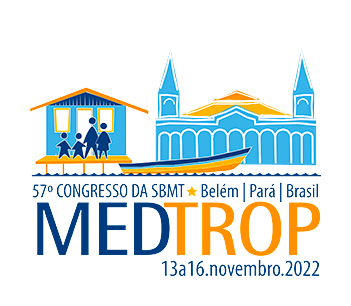Dados do Trabalho
Título
Serum Biomarkers Associated with SARS-CoV-2 Severity
Introdução
A better understanding of the broad spectrum of immune responses to SARS-CoV-2 infection that differentiate mild from severe cases is critical for better prognosis assessment and identification of future biomarkers.
Objetivo(s)
The aim of the study was to identify differences in the levels of serological biomarkers between individuals positive for mild and severe Covid-19.
Material e Métodos
The study is part of the Multicenter Study of the Natural History of the Novel Coronavirus SARS-CoV-2 in Brazil (REBRACOVID). We included participants from four Brazilian cities, over 18 years old, from October 2020 to June 2021. We performed the test for SARS-CoV-2 by Quantitative Reverse Transcription Polymerase Chain Reaction (RT-qPCR) and blood sample collection for the index cases (participants with clinical suspicion of flu, with a positive test for SARS-CoV-2, hospitalized and non-hospitalized) and from household contacts of non-hospitalized index cases (regardless of whether they had symptoms). With biological serum samples, assays were performed using MAGPIX Luminex® xMAP® technology, using three different MILLIPLEX® Map panels.
Resultados e Conclusão
Seventy-one biomarkers were quantified in sera from patients with SARS-CoV-2 infection and controls. We correlated the levels of biological markers with the Negative (C), asymptomatic (A), non-hospitalized (mild-M) and hospitalized (severe-S) control groups. Among the angiogenesis markers, we identified 6/17 that presented significantly different levels between the groups (EGF, IL-8, HGF, HB-EGF, VEGF-C, VEGF-A), always with higher levels of these biomarkers in the most severe stages. Among cardiovascular disease markers, 7/10 showed significant differences between groups (D-dimer, GDF-15, myoglobin, sICAM-1, MPO, P-selectin and Lipocalinlipocalin-2/NGAL). The D-dimer, GDF-15 and sICAM-1 biomarkers of the severe case group were the highest. Of the evaluated cytokines/chemokines, 9/44 showed a statistically significant difference between the groups (IL-6, IL-7, IL-18, IP-10, M-CSF, MDC, MIP-1 beta, PDGF-AA and TNF alpha). IL-6, IP-10, M-CSF, MDC and MIP-1 beta were higher in severe cases than in group C. Therefore, it is possible to state that, among the biological markers analyzed, we observed important changes in patients infected with SARS-CoV-2 who required hospital care. We suggest that further studies may be fundamental to better associate biomarkers with the severity, treatment and prognosis of COVID-19.
Palavras-chave
COVID-19, SARS-CoV-2, Severity, Biomarkers, Immunity
Área
Eixo 09 | COVID-19
Autores
Fabiani de Morais Batista, Marco Antonio Moreira Puga, Patricia Vieira Silva, Roberto Oliveira, Paulo Cesar Pereira Santos, Bruna Oliveira Silva, Daniel Henrique Tsuha, Crhistinne Cavalheiro Maymone Gonçalves, Rômulo Pessoa e Silva, Guilherme Ribeiro, Julio Croda
